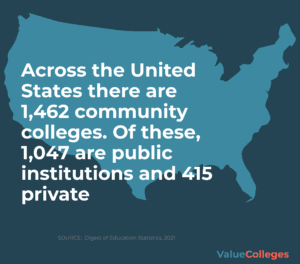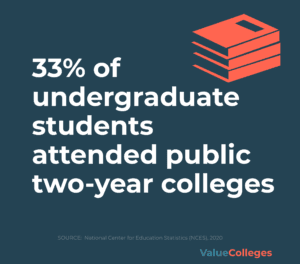Ultimate Guide to Community College

Find your perfect value college
Chances are, you’re familiar with the community colleges in your area as you attended high school. High school students frequently attend vocational classes at the local community college to have a jump start on their careers after graduating from high school. But just what is a community college? They frequently get overlooked or given less weight in terms of their academic value due to a majority of community colleges offering mainly certificates and associate’s degrees. Many prospective students don’t think of attending a community college for a four-year degree despite the many advantages community colleges offer. It’s worth taking a look at the question of “what is a community college” in more detail and learn more about the benefits of starting one’s secondary education at the local community college.
What is a Community College, and What Makes It Different?

First, to answer the question of “what is a community college?” The definition of a community college is a government-supported institution that offers two-year degree programs that award an associate’s degree in sciences or the arts, certificate programs, technical studies, and continuing education. Part of the community college definition is the fact that community colleges attract a local student body, are non-residential, and are funded by the public and local and state government. Each state is different in how it funds community colleges, but one can assume that a community college receives local government funding at the very least. The purpose of community colleges across the U.S. is to provide an affordable education for students and create an educated labor pool for employers.
Featured Programs
The definition of a community college is not complete without comparing them against a university or college. Four-year institutions award bachelor’s degrees in various educational disciplines provided a student competently passes their classes and earns the requisite amount of credit hours for their discipline. The same goes of community colleges, except a majority of community colleges in the U.S. do not award a bachelor’s degree. Instead, they award associate’s degrees to students who have attended for at least two years to earn the required amount of credit hours, and have passed the required classes for a specific area of education.
A student who has earned their associate’s degree has learned knowledge that can be applied to many positions at the entry level or a step above. This is also part of a community college definition — preparing students to start their career at the entry level through the process of educating them with sufficient knowledge to perform their duties. Earning a certificate or associates degree is the first step towards entering into a career field and getting on-the-job experience. Some graduates may find they want to work in a different career, or leave the workforce to earn a higher degree. Credits earned at a community college are often transferrable which saves the student time and money on earning a higher degree or switching to a different educational pathway.
Related Rankings:
- Top 50 Best Community Colleges
- Top 50 Best Value Online Community College
- 10 Highest-Paying Community College Degrees
- 10 Highest-Paying Tech School Degrees
What Are the Advantages of Community College?
The first thing you might think of when considering going to community college first is the fact you’ll save money over the course of your education. Going to community college does save you money on your core curriculum classes, but it also offers the opportunity to earn an associate’s degree prior to attending a university. Another one of the advantages of community college is the fact that you can attend a campus that’s close to home, or take classes online which further saves you money and time. It’s normal to ask the question of “should I go to community college?” in light of the fact that community colleges aren’t usually considered prestigious in terms of their education. However, there are many advantages to going to a community college first, then transfer the credits to a four-year degree program for a bachelor’s degree.

One of the most common, or popular, advantages of community college is cost. It’s one of the reasons why people go to community college in the first place. Classes such as English, literature, various types of math classes, basic science classes, humanities and arts are offered at community colleges and aren’t very different than what’s offered at a four-year university. Students can save a lot of money on tuition by going to community college first and taking core curriculum classes that are eligible for transfer to universities. Another one of the advantages of community college is the fact that a student can earn an associate’s degree in their chosen field, enter the workforce, and return to university for a bachelor’s degree after gaining work experience.
Students who seek out extra-curricular activities might find themselves asking “why go to a community college?” when most community colleges are commuter schools and aren’t perceived as having an inclusive experience. The fact is, community colleges have intercollegiate sports teams, recreational facilities, theaters, art programs, and clubs the same as universities. Going to community college doesn’t have to be an experience akin to going to work. It can also be one that’s rich in extracurricular activities and experience along with the opportunity to meet like-minded people and have supportive classmates. If the question you’re asking yourself is one of “why should I go to a community college” in terms of experiencing campus life, you might be pleasantly surprised at the richness of experience offered by a community college.
Community colleges accommodate students year-round by offering classes that are required of a student’s core curriculum, but may not be offered by a university during a summer semester. Students who are attending a university, but want to accelerate the earning of their degree, can take classes at the community college during a summer semester, then transfer the credits to their university. A student needs to make sure that the credits earned at the community college are accepted by their university before signing up. In the event the credits are transferrable, the student can save money on their degree and graduate earlier than their peers.
Another aspect that answers the question of “why go to a community college in the first place?” is the fact that you can go to community college for as long as you like, take as many classes as you like, and not find yourself beholden to a degree track if that’s not your goal. A student can earn certificates that support their career goals, pick up classes in different fields of education and learn about a topic that relates to their main career goal, or take a class for the sake of taking a class to learn and not worry about the cost of doing something different for a semester.
Going to community college first ultimately saves you money and lowers the amount of post-graduate student loan debt. It’s one of the strongest reasons for why do people go to community college in the first place. Another reason for why you should go to community college is that, if you’re not in a rush to get your bachelors degree, you can earn an associates degree that opens doors to a chosen profession. Education doesn’t stop after a degree is earned, but it does change during employment. However, learning job skills and processes helps with income and planning for a return to school for a bachelors degree. Some schools offer credit hours for work experience which further saves on the cost of tuition and time spent in class while earning a bachelors degree in one’s chosen profession.
How Much Does Community College Cost?
Tuition costs are rising, but across the country, the average community college cost is only about $4,700 a year for in-state students and $8,500 for out-of-state students. The actual average cost of a community college is different in each state, and varies from school to school. When looking at how much do community colleges cost, you’ll find that they can be as low as $3,000 and as high as $10,000 per academic year. A majority of community colleges are at the lower end of the tuition range, but higher-cost community colleges tend to provide curriculums that rival higher-end universities and can still be considered affordable.
The main reason why the cost of a community college is lower than a university comes down to its funding. Community colleges are frequently part of a public/state higher education system which enables the schools to be subsidized through local and state taxes. Students still have to pay tuition, but the subsidized cost of a community college enables more students to attend higher education than not. State universities are also subsidized, but tend to have higher costs due to campus residency requirements and other fees. It’s worth noting that the costs of higher education are only subsidized for state residents as it’s their taxes that are being used to fund the schools. Enabling the residents of a state to earn a higher education at a lower cost only serves to improve the labor pool for employers and enables residents to have better job opportunities.
Students who ask the question of “how much does community college cost?’ can get an idea of the cost per credit hour by either looking at the community college website, using a tuition calculator, or contacting the school directly to find out the average community college costs for an associates degree program or taking classes for transfer. The cost of community colleges isn’t easily pinned down due to each class having books and materials requirements, miscellaneous fees, and financial aid.
It’s true that the cost of community college makes it easier for students to save money prior to attending and graduate with little or no debt. Students can further lower the average cost of community college by applying for scholarships and grants. These financial instruments work the same for community colleges the same as they do for colleges and universities. Taking advantage of grants and scholarships for community college not only lowers the average community college cost, it also enables a student to save even more money for the university they attend after earning their associates degree or taking their general electives courses.
Pinning down the average tuition of community college isn’t always easy due to classroom fees, cost of books, materials needed to take a class and administrative fees. These costs, while increasing the average cost for community college, are usually reasonable or commensurate with class requirements. For example: a laboratory class may have higher fees than an English literature class due to the fact the lab class requires safety equipment, lab materials and may even charge for disposal fees. Whereas the English literature class requires the purchase of specific books that are usually in the public domain and affordable.
Community colleges are largely commuter colleges in that students don’t live on campus. Instead, they attend the campus or participate in online classes. However, there are community colleges in rural areas of the country that offer dorm rooms to students who live a distance away from the campus. This can add to the average cost of community college, but it’s beneficial for students who would otherwise face a long drive back and forth to school every day.
Can I Transfer Community College Credits to a University?

The general answer to the question of “can I transfer credit from community college to a university” is yes. But, and there’s always a but, you need to be enrolled at a community college with transferable community college credits to university. Not all classes are eligible for community college transfer which means you have to make sure to take classes that qualify for transfer from a community college and, when you’re not sure, that you find out about what’s considered transferable community college credits to university from the university you plan to attend. Fortunately, most universities accept community college credits for classes that are similar in nature or content to the ones offered at the university that’s a student is seeking to transfer into.
Currently, a total of 30 states allow students to transfer classes from community college to university in their entirety, and the university cannot force a student to repeat a general elective class. This makes it easier for students in some states to make the decision to attend community college due to the automatic community college transfer. The 20 remaining states that don’t have policies that allow transfer credit from a community college are not barring the practice so much as they’re leaving it up to the educational systems to create their own policies for transferring credit. Students who aren’t sure if they’re in one of the 30 states with a guaranteed transfer credit from community college can quickly find answers through an internet search.
Students who earn an associates degree from a community college may be able to transfer credit from community college to a university in their entirety. That means a student may be eligible to transfer 60 or so credit hours to a university and begin their junior year of university. The transferable community college credits to university lets a student maintain a steady attendance and graduate with a bachelors degree in four consecutive years of schooling. When doing a plan of 2 years at community college then transfer to university, keep in mind that the university will require the transfer student to take 60 credit hours to complete the degree.
Universities frequently partner with community colleges and create transfer programs in certain educational tracks. For example: a student attends a community college to become a registered nurse (RN) and seek employment in that field. The student finds that they want to earn their bachelor of science in nursing (BSN) at a university or college that offers the degree program. Many community colleges have transfer agreements with four-year degree schools that enable an RN to transfer the entirety of the credits they earned at community college and transfer community college credits towards their BSN degree. Some four-year degree programs also award credit hours to working RNs, enabling them to earn their BSN faster and with lower cost.
Transferring credit from community colleges to universities comes with specific eligibility requirements. Most universities that accept transfer credit from community college require the student earn at least a “C” grade for each course. In the event the class has a PASS/FAIL system of grading, the community college transfer request has to be able to show that the student passed the course with the equivalent of the required passing grade. As long as a student, or the school, can show that the equivalent grade is a “C”, the credits are usually accepted at a university.
Another thing to keep in mind when looking into transferring credit from community colleges to universities is the fact that the grades won’t transfer. This isn’t an issue for students who aren’t seeking to maintain a high grade point average for scholarships or prestige, but it’s something that students who want to graduate at the top of their class should seriously consider. Students who have high grades throughout their education are considered more desirable by employers, but splitting the GPA between community college and university can affect the final average grade at graduation.
What Can I Study at Community College?

You can study just about everything while earning a degree at community college. Ultimately, you’re the one who makes the decision about how to best utilize your community college experience. Students who are uncertain about their career goals can take the opportunity of the lower cost of community college and take classes that offer insight into what a particular career is like. You’ll find that you’re not stuck in a single educational track at a community college due to the low cost and ease of changing your mind when it comes to deciding upon a career.
A majority of community college degrees fall under the associate of arts or sciences umbrellas. The educational track in the arts of a particular discipline means the education tends more towards the theoretical study and comprehension of ideas. Whereas the science track degree at community college tends to focus on learning mathematics and spending time learning in laboratories. Both types of community college degrees require a community college to offer the appropriate classroom, materials, equipment and qualified teachers to impart knowledge, test and grade a student’s performance. All classes included in a community college degree are offered at the 100 and 200 level (years one and two) primarily because the freshman and sophomore year of college are designed to build upon knowledge that was learned in high school with some advancement.
Oftentimes, community college degrees mirror the degrees available at four-year degree schools. This makes it easier for students to transfer their community college majors to a four-year major and earn a bachelors degree while spending less money overall. The education included for an associates degree at community college will prepare a student to enter a university as a junior and continue their education without fear of falling behind. Students who decide to start their degree at community college, then transfer, can save themselves money on their tuition while ultimately earning a degree that boosts their career from the start.
Earning an associates degree at community college is effective for getting employment, but the degree itself won’t be considered by a university apart from demonstrating ones desire to pursue a chosen educational track. This fact means students who are looking to get their general studies completed before transferring the credits don’t need to be concerned with taking classes that lead to a degree. Students who want to start their career will benefit from taking the requisite classes required to get their associates degree at community college.
Just about all community college majors require students take electives classes in order to broaden their education. Sometimes taking these electives result in a certificate that pairs with the educational track for the types of degrees in community colleges. Not only does the earning of a certificate alongside the associate’s degree look good on a resume, it also helps a student discover another area of their chosen degree track. The student can opt into taking more classes in a complimentary area of study in the future, or work with the school to earn more than one type of associate’s degree through an accelerated degree program. The only limit to the types of degrees a student can take at a community college is the community college itself. Community colleges are a great place for a student to explore different types of degree tracks, and their low cost make it easier for a student to justify their ongoing education.
Related Rankings:
Top 50 Best Community Colleges
Top 50 Best Value Online Community College
10 Highest-Paying Community College Degrees
10 Highest-Paying Tech School Degrees
Best College Admissions Consultants
Featured Programs
Aya Andrews
Editor-in-Chief
Aya Andrews is a passionate educator and mother of two, with a diverse background that has shaped her approach to teaching and learning. Born in Metro Manila, she now calls San Diego home and is proud to be a Filipino-American. Aya earned her Masters degree in Education from San Diego State University, where she focused on developing innovative teaching methods to engage and inspire students.
Prior to her work in education, Aya spent several years as a continuing education consultant for KPMG, where she honed her skills in project management and client relations. She brings this same level of professionalism and expertise to her work as an educator, where she is committed to helping each of her students achieve their full potential.
In addition to her work as an educator, Aya is a devoted mother who is passionate about creating a nurturing and supportive home environment for her children. She is an active member of her community, volunteering her time and resources to support local schools and organizations. Aya is also an avid traveler, and loves to explore new cultures and cuisines with her family.
With a deep commitment to education and a passion for helping others succeed, Aya is a true inspiration to those around her. Her dedication to her craft, her community, and her family is a testament to her unwavering commitment to excellence in all aspects of her life.